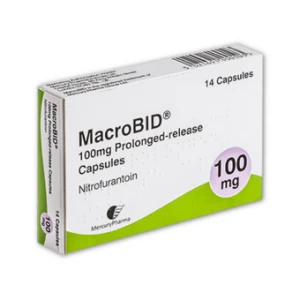Cystitis in Men: A Complete Breakdown
Table of contents:
Cystitis is a common form of urinary tract infection (UTI). The term is used to describe inflammation in the bladder, with its roots derived from the Greek language. Most of the time, the condition is caused by bacteria entering the urethra (the tube which carries urine out of the body).
In women, cystitis is a condition that is usually experienced at least once, although in some cases it can be more persistent. Although it’s much less prevalent in men, the infection could be a sign of something more serious, so it’s essential to ensure you have a thorough understanding of the situation.
Join us as we outline everything you should know about cystitis in men, such as how to identify it, potential causes, available treatments, and the actions you can take to prevent it from occurring.
Can Men Get Cystitis?
Yes, men can get cystitis; however, the condition is much more common in women. This is because men have a longer urethra, which means the bacteria has further to travel to reach the bladder. In general, cystitis in men should be checked by a doctor, as it may be a sign of an underlying medical issue.
Men will typically experience cystitis later in life. Indeed, it is estimated that there are fewer than 10 cases of the infection per 10,000 men under the age of 65 each year. The condition is most common in older men, particularly if they are unwell.
It’s important that men don’t ignore the symptoms of cystitis, as the situation can get serious if not treated quickly.
What Causes Cystitis in Men?
There are several causes of cystitis in men, ranging from sexual intercourse and the use of catheters to infections in the prostate or kidneys. The main triggers are:
- Sexual Activity: Increases the chances of bacteria entering the urinary tract as a result of friction.
- Blocked Urinary Tract: Conditions that can block the flow of urine, such as kidney or bladder stones, can increase the risk of urinary tract infections.
- Urinary Catheter: Inserting a catheter can introduce bacteria into the bladder, thereby increasing the risk of infection.
- Enlarged Prostate: Much like kidney and bladder stones, an enlarged prostate can make it difficult for urine to freely flow through.
- Holding in Urine: This enables any bacteria present in the urethra to grow and multiply. It can also damage the bladder lining and increase the risk of urinary tract infections.
- Damage to the Urethra: Any damage or narrowing of the urethra (urethral stricture) can stop your bladder from emptying fully.
- Previous UTI: Having a urinary tract infection increases the chances of another one developing.
- Bladder Surgery: Can result in direct bladder trauma, urinary retention, or the erosion of synthetic materials into the bladder or urethra.
Certain underlying medical conditions can also cause or increase the risk of cystitis in men. These include:
- Diabetes
- HIV
- Kidney and prostate conditions

Cystitis in Men: Symptoms to Watch Out For
The common symptoms of cystitis in men are similar to those experienced by women, though older men may notice other indicators. Cystitis in men symptoms include:
- Burning or stinging sensation when urinating
- Needing to urinate urgently
- A frequent urge to urinate, but only passing a small amount
- Needing to urinate more during the night
- Abdominal pain
- Traces of blood in the urine
- Dark, cloudy, or strong-smelling urine
- Feeling feverish or generally unwell
In older men, cystitis can also cause:
- Confusion or agitation
- Incontinence
- Shivering
If left untreated, cystitis can spread to the prostate gland and cause a condition known as prostatitis. This can then lead to difficulties such as:
- Straining to urinate
- Having difficulty urinating
- Pain in the penis, testicles, scrotum, or anus
- Pain when ejaculating
- High temperature or fever
- Lower back and abdominal pain
Trimethoprim UTI Tablets
- Effectively treats cystitis
- Short course of treatment
- No extra cost
How Long Does Cystitis Last in Men?
Mild cases of cystitis in men often resolve on their own within a few days, especially if you’re managing symptoms at home by increasing your water intake and urinating frequently to flush out the infection. However, the NHS recommends that men visit their GP if they suspect they have cystitis as a precautionary measure to check for any underlying problems.
If your GP believes your cystitis symptoms are mild, they may simply advise you to take over-the-counter painkillers, such as paracetamol, and drink plenty of water. You may also need to avoid sex until you feel better. More serious cases can be resolved using antibiotics.
Should you feel severely unwell, have a fever, chills, confusion, or be vomiting, you may need to be admitted to the hospital for treatment.
How to Prevent Cystitis in Men
There are several steps you can take to help prevent cystitis from occurring, including drinking plenty of fluids, practising good hygiene, and emptying your bladder after sex. For men, it is important to see a doctor to diagnose and treat cystitis and to diagnose any underlying conditions, such as an enlarged prostate, which can make you more susceptible to infection.
Some of the things you can do to prevent cystitis include:
- Staying hydrated can dilute urine and encourage frequent urination, which helps to flush bacteria from the urinary tract
- Practising good hygiene by washing the genital area with unperfumed soap and water, and avoiding perfumed soaps, shampoos, and bubble baths, which can cause irritation
- Urinating after sex to empty your bladder to help flush out any bacteria that may have entered the urethra
- Having protected sex as having unprotected intercourse can be a risk factor for cystitis and STIs
- Urinating as soon as you feel the urge and not holding it in
- Wiping from front to back after going to the toilet to stop bacteria from the anus entering the urethra and causing infection
- Wearing loose, cotton underwear allows your genital area to breathe better than synthetic materials
- Limiting bladder irritants, like coffee, alcohol, and fruit juices, that can irritate the bladder lining
- Taking showers rather than baths to limit the time your genitals are exposed to soaps and cleaning products
- Addressing any underlying conditions that may make you more susceptible to cystitis or an enlarged prostate that can slow urine flow and trap bacteria

How to Treat Cystitis in Men
The primary treatment for cystitis in men is a course of antibiotics, typically lasting between 7 and 14 days. This is designed to clear the bacterial infection. There are also several things you can do at home to help manage symptoms, such as getting plenty of rest and staying well-hydrated.
Antibiotics
Doctors will typically prescribe a course of antibiotics to treat the infection. These will usually be Trimethoprim or Nitrofurantoin, which work by disrupting the bacteria’s DNA or preventing them from making substances essential to their survival.
A urine sample will usually be taken when you first present yourself to the GP to confirm whether it is cystitis and which bacteria are responsible for the infection. You can begin your course of antibiotics while awaiting the results, as this may take several days to complete. Once the test results are available, your doctor can adjust your treatment if you’re not seeing any improvement.
Self-Help Measures
During treatment, or if antibiotics are deemed unnecessary, you can make yourself more comfortable or help get rid of cystitis by doing the following:
- Taking over-the-counter pain relief, such as ibuprofen or paracetamol, up to four times a day
- Drinking plenty of clear fluids, especially water, to flush out bacteria
- Holding a hot water bottle or heat pad on your stomach to relieve pain and discomfort
- Avoiding foods and drinks that may irritate your bladder, like coffee, alcohol, chilli, and fruit juice
- Avoiding sex until the infection has cleared up
- Urinating when you feel the urge
Some people take cranberry drinks or products daily to try to prevent cystitis from occurring. While this may help, there’s no evidence that doing so can ease symptoms or treat the infection if it has already started.

Can Men Take Cystitis Sachets?
No, men should not take cystitis sachets unless advised to do so by a clinician. These sachets have been specifically formulated for women. If you are a man and suspect you may have cystitis, it is important that you see a doctor, as the underlying cause may be more serious and require different treatment.
Why Can’t Men Take Cystitis Relief Sachets?
There are several reasons why men should avoid cystitis relief sachets, including:
- Different medical needs: Cystitis is less common in men and can suggest an underlying issue that needs a doctor’s attention and appropriate treatment, such as an enlarged prostate, blockage, or infection.
- Specifically formulated for women: Many cystitis relief sachets are formulated for women and do not address the potential underlying causes of cystitis in men. Cystitis commonly affects women, but in men, the symptoms can be a sign of an underlying issue that needs medical attention.
- They only provide symptom relief: Cystitis sachets usually contain sodium or potassium citrate, which helps make urine less acidic, relieving symptoms such as burning or stinging when urinating. However, they do not treat the cause of the infection.
- Can lead to treatment delays: Self-treating with cystitis sachets could delay treatment for a more serious condition or delay access to antibiotics.
Available Cystitis Treatment for Men
If a clinician diagnoses cystitis, the first-line treatment will be antibiotics to help kill the bacteria responsible for the infection. If you are severely unwell, you may need to go to the hospital, as this may indicate the infection has spread. The primary antibiotics prescribed for men with cystitis are trimethoprim or nitrofurantoin.
Prescription Doctor is pleased to offer both of these products as part of our service. Let’s take a look at our cystitis treatments for men in more detail:
Nitrofurantoin
Nitrofurantoin, also known by the brand name Macrobid, is an antibiotic used to treat various bacterial infections, including urinary tract infections (UTIs) and cystitis. It works by filtering out from your blood and into your urine, where it can infiltrate the cystitis-causing bacteria and kill them by damaging their DNA. Nitrofurantoin has a cure rate of between 79% and 92% and is usually prescribed as a 7-day course for men. The usual dose is one 100 mg modified-release tablet twice a day for the duration of treatment. However, if you have prostatitis, nitrofurantoin will not be suitable for you.
Some research has shown that nitrofurantoin is more effective than the alternative antibiotic, trimethoprim, for uncomplicated cystitis. The results showed that the clinical cure rate with trimethoprim was 79%, compared with 84% with nitrofurantoin.
Nitrofurantoin (Macrobid) UTI Antibiotics
- Kills bacteria
- Short course treatment
- Eligible for next-day delivery
Trimethoprim
Trimethoprim is another antibiotic prescribed for cystitis that works by blocking the production of folic acid, a vital nutrient bacteria need to survive. By stopping its production, bacteria cannot replicate and will die off. The short-term effectiveness of trimethoprim is 94% after a 7-day course, according to some research. The usual course of trimethoprim for cystitis in men is 200 mg twice a day for 7 days.
Trimethoprim UTI Tablets
- Effectively treats cystitis
- Short course of treatment
- No extra cost
Cystitis in Men: Frequently Asked Questions
Cystitis is a common UTI in women, but in men, it can be a sign of an underlying condition. Although treatments are available, you may have questions about its prevalence, treatment, or how you got it. Here, we answer some of the most frequently asked questions about cystitis in men.
Is Cystitis Common in Men?
No, cystitis in men is not common and is much less frequently diagnosed than in women because men have a longer urethra that provides better protection against bacteria reaching the bladder. It is estimated that fewer than 10 cases of cystitis occur per 10,000 men under 65 years of age per year.
Can Men Take Cystitis Relief?
No, most over-the-counter cystitis relief sachets are not recommended for men and have been specifically formulated for women. If you are a man and suspect you have cystitis, you should consult a doctor. They will properly diagnose the issue and prescribe the right course of treatment, usually antibiotics.
Can Men Catch Cystitis from Women?
No, men cannot catch cystitis from women. Cystitis is bladder inflammation typically caused by bacteria entering the urinary tract. It is not a sexually transmitted infection (STI), but sexual intercourse can increase the chance of developing a UTI because bacteria can be transferred between partners during sexual activity.
What is Honeymoon Cystitis in Men?
Honeymoon cystitis is a term used to describe a UTI that occurs shortly after sex. However, it is not a medically recognised term and is not usually associated with men, as cystitis caused in this way is rare due to their longer urethra, which makes it difficult for bacteria to reach the bladder.

Reliable Support for Cystitis in Men
If you’re a man and suspect you have cystitis, it’s important to take swift action. Not only will you want to treat the infection quickly, but you’ll also need to consult a GP to ensure there’s no underlying issue that needs to be taken care of.
When it comes to the treatment of cystitis in men, Prescription Doctor has you covered. Simply complete the online medical questionnaire, and our experienced clinicians will determine whether your selected treatment, Trimethoprim or Nitrofurantoin, is suitable for your circumstances. Orders approved before 3pm on a weekday are eligible for next-day delivery, ensuring fast access to your medication.
We also understand that experiencing cystitis or other UTIs can cause embarrassment, which is why you can access our service from the comfort of your own home at any time, eliminating the need to book an appointment. Additionally, your medication will be dispatched from our General Pharmaceutical Council-registered pharmacy in plain packaging to ensure complete discretion.
Ready to get started? Begin the consultation process with Prescription Doctor today.
Sources
- EMC (2025): Nitrofurantoin 100mg Capsules.
- Frontiers in Cellular and Infection Microbiology (2023): Nitrofurantoin: properties and potential in treatment of urinary tract infection: a narrative review.
- JAMA Internal Medicine (2007): Short-Course Nitrofurantoin for the Treatment of Acute Uncomplicated Cystitis in Women.
- National Library of Medicine (2023): Cystitis.
- NICE (2025): Scenario: Lower UTI in men.
- PubMed (1990): Efficacy of single-dose versus seven-day trimethoprim treatment of cystitis in women: a randomized double-blind study.
- NHS: Cystitis.
Authored By

Leanne Edermaniger
Medical Content WriterPublished on: 07/11/2025
Reviewed By

Mohamed Imran Lakhi
MPharm - Lead PharmacistReviewed on: 07/11/2025
© 2013 - 2026 Al Muhsineen Limited. All Rights Reserved. Registered Pharmacy: 34 Halliwell Road, Bolton BL1 8RL. Registered Office: 254 First Floor, Shearbrow, Blackburn, England, BB1 8DS







